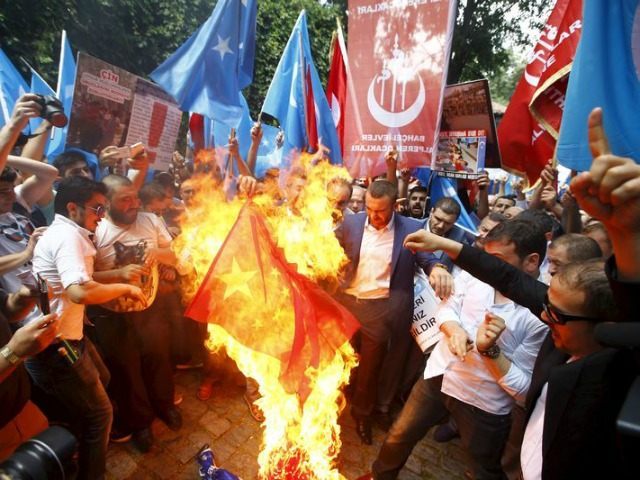The leader of Turkey’s Nationalist Movement Party (MHP) excused a mistaken attack on Korean tourists by Turks attempting to protest the Chinese government by claiming the protesters were “young people” confused by Asians’ “slanted eyes.” Turkish nationalists have organized protests against China for its crackdown on Islam in Turkic Uyghur communities.
“Some can pull these young people and they may follow them. Moreover, what is the difference between a Korean and a Chinese? They both have slanted eyes,” Devlet Bahçeli told Turkish newspaper Hurriyet, attempting to explain the attack on Korean tourists earlier this week intended to make a statement in support of China’s Uyghur population. A separate attack also destroyed the storefront of a Chinese restaurant, owned by a Turkish national who employs a Uyghur cook.
Hurriyet notes that, in addition to these protests, various nationalist groups linked to the MHP have begun loudly expressing anti-Chinese sentiments, including a poster at the headquarters of one nationalist group, “Idealist Hearths” (Ülkü Ocakları), reading, “We Crave Chinese Blood.”
Idealist Hearths members have been blamed for the attack on Korean tourists. The group has categorically denied that the incident occurred, issuing a statement reading, “Such an offensive incident as alleged has never occurred.”
Meanwhile, the owner of Happy China restaurant tells media he is shutting down his business, despite having opened merely six months ago. Cihan Yavuz says attackers yelled, “We do not want a Chinese restaurant here,” and the risk of maintaining the business is too high. “We oppose the incidents in East Turkestan and the cruelty against Uighur Turks. We are Turks. Our chef is also a Uighur Turk. We are trying to make a living here,” Yavuz says, adding that his restaurant, catering to a Muslim audience, did not serve alcoholic drinks and was a Muslim-friendly institution.
Protests began, following an official statement by the Turkish government condemning the treatment of Uyghurs in western Xinjiang, China–“East Turkestan”–in which Turkey expressed “deep concern” over reports that the Chinese communist government had banned the public observation of the holy month of Ramadan. In addition to a ban on Islamic clothing on public transportation and burqas in general in Xinjiang, China has forced Muslim businesses to sell alcohol and cigarettes in the region, both banned by Islamic teaching, in an attempt to dilute the religion’s influence. The Chinese government has also made public statements promoting intermarriage between Uyghurs and the majority Han Chinese population, hoping to dilute that minority’s influence on the nation. These policies have triggered a backlash among Uyghur populations and exacerbated tensions with separatist groups the Chinese government fears have ties to Islamist terrorists.
Despite Chinese government efforts, Islam is the fastest-growing and most popular religion among Chinese nationals under 30, closely followed by Catholicism, according to a recent government survey. Some Chinese experts attribute this to Muslim populations in China passing religion down throughout generations more reliably than others living closer to the communist government of Beijing; highlighting that point, the same study found Taoism and Buddhism the most popular study among Chinese people over 60.
“Uighurs live and work in peace and contentment and enjoy freedom of religion under the rules in the constitution. … So the so-called ‘Xinjiang ethnic problem’ you mention that has been raised in some reports simply does not exist,” said Chinese Foreign Ministry spokeswoman Hua Chunying this week in response to Turkey’s statement of concern.

COMMENTS
Please let us know if you're having issues with commenting.